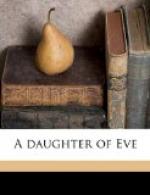Nathan’s situation was, therefore, to all appearance, extremely brilliant. He had many friends. The two plays lately produced had succeeded well, and their proceeds supplied his personal wants and relieved him of all care for the future. His debt to du Tillet, “his friend,” did not make him in the least uneasy.
“Why distrust a friend?” he said to Blondet, who from time to time would cast a doubt on his position, led to do so by his general habit of analyzing.
“But we don’t need to distrust our enemies,” remarked Florine.
Nathan defended du Tillet; he was the best, the most upright of men.
This existence, which was really that of a dancer on the tight rope without his balance-pole, would have alarmed any one, even the most indifferent, had it been seen as it really was. Du Tillet watched it with the cool eye and the cynicism of a parvenu. Through the friendly good humor of his intercourse with Raoul there flashed now and then a malignant jeer. One day, after pressing his hand in Florine’s boudoir and watching him as he got into his carriage, du Tillet remarked to Lousteau (envier par excellence):—
“That fellow is off to the Bois in fine style to-day, but he is just as likely, six months hence, to be in a debtor’s prison.”
“He? never!” cried Lousteau. “He has Florine.”
“How do you know that he’ll keep her? As for you, who are worth a dozen of him, I predict that you will be our editor-in-chief within six months.”
In October Nathan’s notes to du Tillet fell due, and the banker graciously renewed them, but for two months only, with the discount added and a fresh loan. Sure of victory, Raoul was not afraid of continuing to put his hand in the bag. Madame Felix de Vandenesse was to return in a few days, a month earlier than usual, brought back, of course, by her unconquerable desire to see Nathan, who felt that he could not be short of money at a time when he renewed that assiduous life.
Correspondence, in which the pen is always bolder than speech, and thought, wreathing itself with flowers, allows itself to be seen without disguise, and brought the countess to the highest pitch of enthusiasm. She believed she saw in Raoul one of the noblest spirits of the epoch, a delicate but misjudged heart without a stain and worthy of adoration; she saw him advancing with a brave hand to grasp the sceptre of power. Soon that speech so beautiful in love would echo from the tribune. Marie now lived only in this life of a world outside her own. Her taste was lost for the tranquil joys of home, and she gave herself up to the agitations of this whirlwind life communicated by a clever and adoring pen. She kissed Raoul’s letters, written in the midst of the ceaseless battles of the press, with time taken from necessary studies; she felt their value; she was certain of being loved, and loved only, with no rival but the fame and ambition he adored. She found enough in her country solitude to fill her soul and employ her faculties,—happy, indeed, to have been so chosen by such a man, who to her was an angel.




